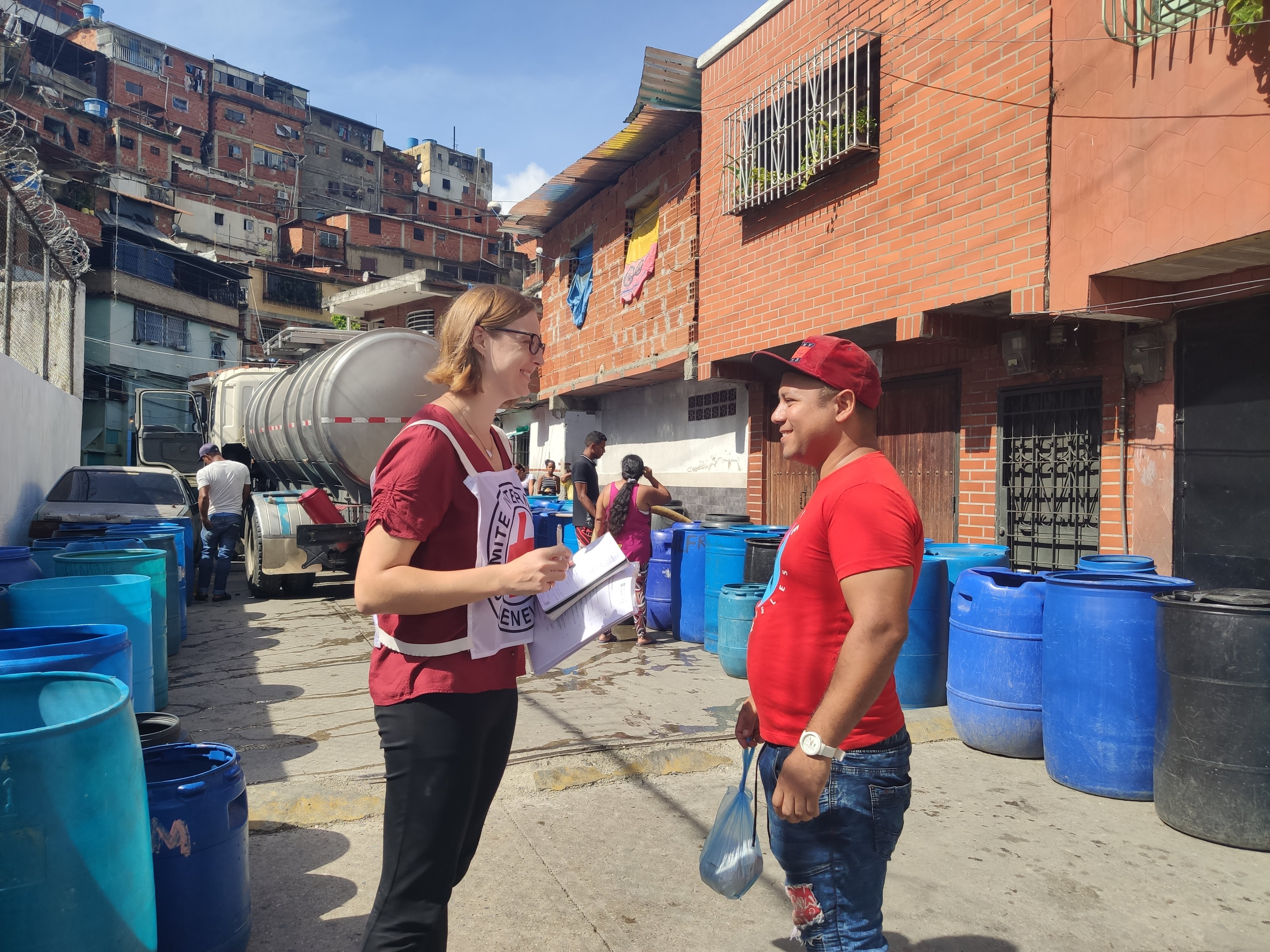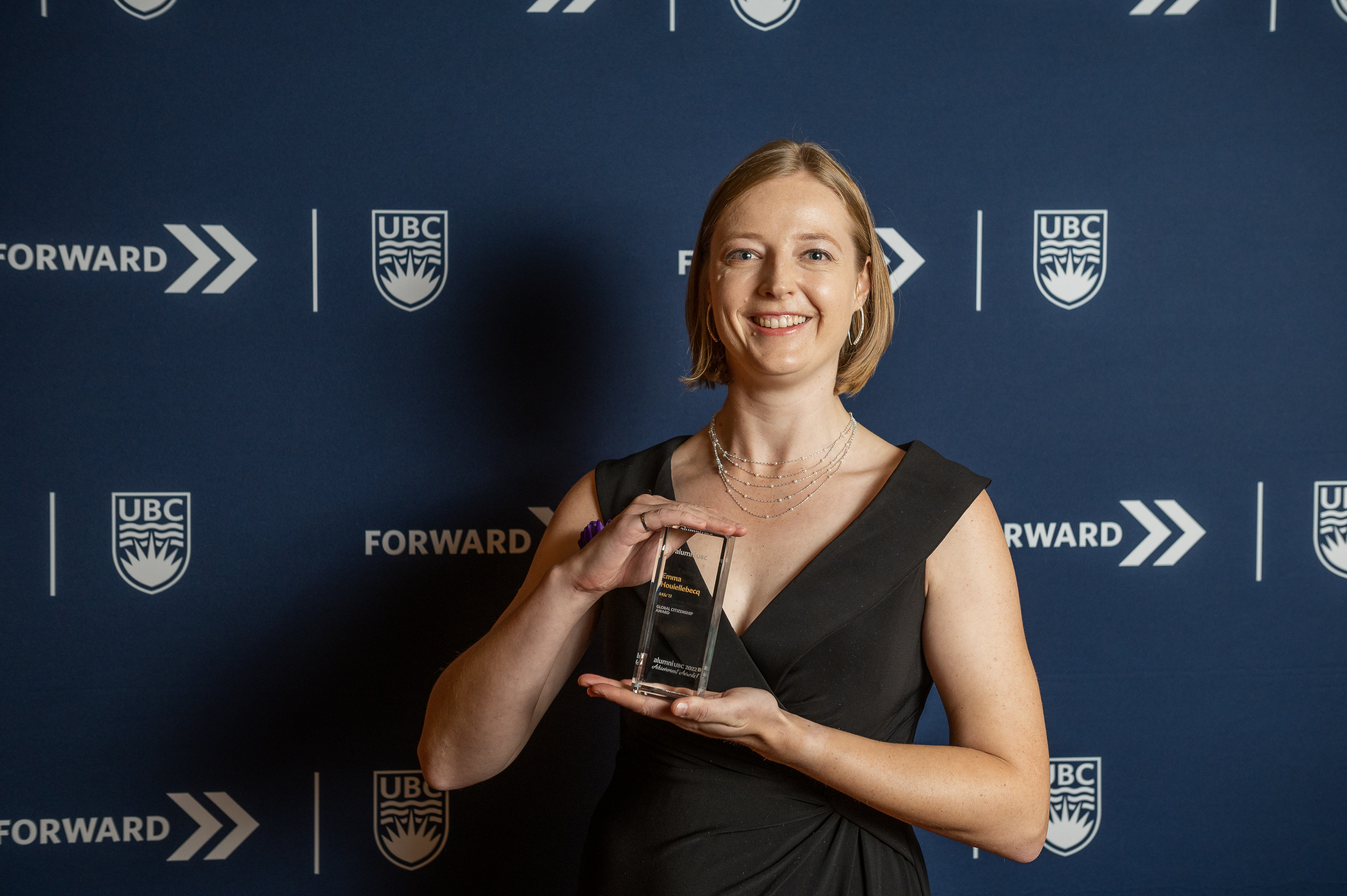Playing to her strengths – the engineer taking her skills to places of crisis
“When you’re working in the field, you’re exposed every day to the challenges faced by the people living there”
Working in some of the planet’s most war-torn and politically volatile nations is a world away from the safe, cobbled streets of Cambridge – but St John’s postgraduate Emma Houiellebecq takes it all in her stride.
Emma is currently working in Gaza and Venezuela as part of a PhD research collaboration with the International Committee of the Red Cross (ICRC), with whom she previously worked as an engineer in South Sudan and Gaza.
The Canadian student has lived through missiles and Covid-19 lockdowns in Gaza, but her skills have proved vital in identifying how to maintain key utilities such as water and energy to help the local population survive in emergency situations.

“In places such as Gaza and Venezuela we see that the infrastructure systems and essential services are not functioning well, that people are not able to receive water and electricity in sufficient amounts,” said Emma. “Our work is to try to understand from a systems perspective what other contextual factors are causing these systems to break down or not function. We also try to understand from the humanitarian perspective what an organisation like the Red Cross can do to more effectively strengthen the resilience of those services.”
As an engineer, Emma took the humanitarian route after working in international development following graduation from the University of British Columbia. “I first worked in Uganda, Rwanda and Eswatini (Swaziland). International development was something I’d always wanted to do. One of my initial purposes of going into engineering was to develop a skill set that could be applied to those sorts of situations,” she said. Moving into the humanitarian sector was a gradual transition. “I saw the convergence of all the major challenges in these types of crisis-hit places. It’s devastating to see and challenging in terms of a work environment. There’s so much to think about.”
Emma came to St John’s as a Gates Scholar in 2016 to do an MPhil and returned in 2021 as a PhD candidate. During her PhD, Emma is conducting fieldwork in Gaza and Venezuela. While Gaza is mired in a protracted conflict, Venezuela is caught up in a political and economic crisis, but there are similarities.
“The situation in Venezuela has resulted in a lack of maintenance and all the infrastructure is collapsing. Like Gaza, this is a case of what we call ‘protracted crisis’,” said Emma. The country has seen a mass exodus of professionals in the last 10 years, which has left a skills gap in the utility sectors. “There is also no budget for maintenance because of the economic crisis the country is facing, so that’s been one of the biggest challenges for the local authorities in Venezuela.
“In Gaza there is very little budget due to the political situation, which has been magnified by the blockade, because the local authorities can’t import the materials and the equipment they need to fix the failing infrastructure.”
“You see first-hand how bad a situation it really is, and how impactful some of the projects are”
One of the major issues is electricity. Power is rotated throughout Gaza, eight hours on and eight hours off, for different facilities and communities. “We’re working with the electricity company to have a better-optimised supply of electricity for all of these facilities; to then be able to prioritise to critical facilities so that hospitals, prisons and water facilities are able to continue receiving power,” explained Emma.
She and her colleagues have improved the electricity supply to communities in a population of 2.2 million. It can take time for projects to come to fruition, especially when the country faces such difficult daily challenges.
“In Gaza there are cycles of tension. Every few months tensions rise, there might be a couple days of a back and forth exchange, and then tensions go down again. And then every once in a while, there’s a longer, more intense conflict,” explained Emma.
“We are always trying to find solutions, to fix problems. Unfortunately the biggest needs are in these very complex areas, which are often neglected because of the risks and because of the challenges of working there.
“From a work perspective, you are constantly being challenged, and from a personal perspective too. When you’re working in the field, you’re exposed every day to the challenges faced by the people living there.
“That’s what keeps the motivation going because you’re seeing first-hand how bad a situation it really is, and how impactful some of the projects are.”
Emma works closely with teams of ICRC engineers and other staff as well as local authorities, building up relationships and sowing the seeds of skills and knowledge needed for the projects to have a chance of success.
Emma is doing her PhD at the Centre for Sustainable Development in the Department of Engineering at Cambridge. She enjoys having the opportunity to work in the field, making a real difference to people’s lives in crisis-hit locations.
After eight weeks of fieldwork in Venezuela last autumn, she has recently returned from a four-week trip back to Gaza. There she was conducting research with the ICRC in its humanitarian interventions to develop two types of systems maps: one for evaluating the impact of ICRC projects on the wider system, and the other (called ‘Shock Maps’) to show how the effects from a shock propagate through the system in order to identify its vulnerabilities.
“It’s a privilege to be able to research my PhD at Cambridge, to have time to go into depth on this topic. In the end, my research is about more effective decision-making and identifying strategic interventions. These are high-level actions that should hopefully play out effectively in the field. I have a real interest in exploring how to strengthen the resilience of infrastructure and essential services.”
“It was a surprise and a huge honour to receive this award. My family were able to be there and it was a really special night”

Her work is being recognised across the globe. Back in Canada in November, Emma was presented with the 2022 Global Citizenship Award at the University of British Columbia’s Alumni Achievement Awards for her contributions in the humanitarian sector. “It was a surprise and a huge honour to receive this award. My family were able to be at the awards gala and it was a really special night.”
Her family are rightly proud. “I think they’ve obviously had their moments of being very nervous. I was in Gaza during the May 2021 war – my mom was glued to the TV images and messaging me on WhatsApp to check I was still safe,” remembered Emma.
“In South Sudan, sometimes I would be without internet for five or six days at a time, so I would tell my family that I wouldn’t be contactable, for example, until the Friday. It was difficult for them to not always have that daily contact.”
In such high-stress environments, Emma uses sport to let off steam. “You need to know what your coping mechanisms are. For me, it’s sport. I know that’s something I have to build into my schedule,” she said.
“In this kind of fieldwork you need to be aware of your limits as well, and know when you need to take a break from such stressful environments.”
In Gaza, Emma was not allowed to exercise outdoors so she used a turbo trainer static resistance platform to turn her bicycle into an indoor bike. She also climbed the equivalent of Mount Everest in three months by stair running in her apartment building. Back in Cambridge she plays football, tennis and basketball, making the Blues’ basketball team last year.
Wherever she is in the world, from South Sudan to the Courts of Cambridge and St John’s – she keeps her feet on the ground.
Watch the video made about Emma for the UBC Alumni Achievement Awards 2022:
Published 17/4/2023